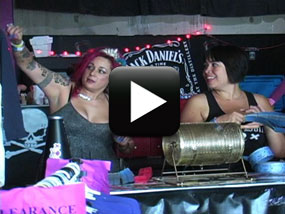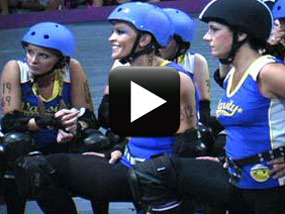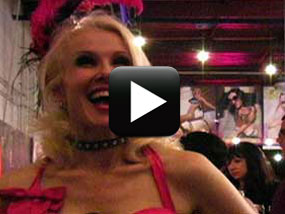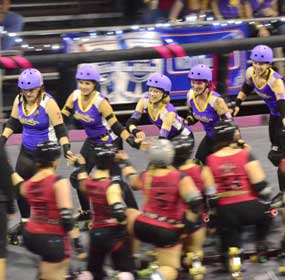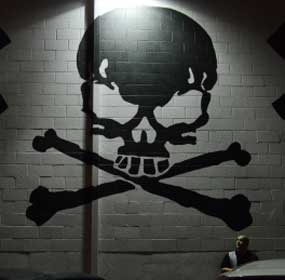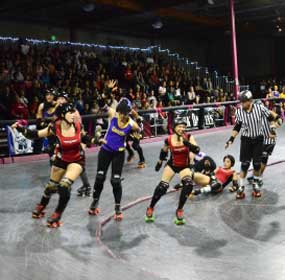[raw]
L.A. Derby Dolls builds confidence, community
Roller derby league co-founded by alumna builds confidence, community among members
Wearing a light blue dress and carrying a chihuahua in a basket, Rebecca Ninburg seemed unintimidating as she watched players slam into each other during a roller derby match on Saturday, featuring a Halloween theme.
She was an unlikely instrument in the development of this aggressive sport. Then she laughed, revealing a mouth full of fake vampire teeth, exhibiting the offbeat essence that defines roller derby.
“Roller derby has a very safe culture where no matter what you look like, there is a place for you,” Ninburg said. “We’re not dealing with the same outside influences that teach girls to be princesses.”
Ninburg, also known by her roller derby name “Demolicious”, graduated from UCLA in 1997 with a degree in fine art before going on to co-found the Derby Dolls, a premiere Los Angeles roller derby league.
Roller derby is a contact sport in which two teams skate on a circular track and attempt to score points by having certain members, called “jammers,” lap the other team. A female-dominated sport, roller derby appealed to Ninburg and her friend and co-founder Wendy Templeton because it is such an aggressive sport.
After Templeton was impressed by a pair of roller derby skates in 2003, the idea for Derby Dolls was born.
“The roller derby skates were just so cool,” Ninburg said. “We admired how badass the women were who played. We had always wanted to start a league, so we just went for it.”
Templeton and Ninburg began travelling to roller rinks, searching for any sign of roller derby players or a league. Ninburg eventually put up an ad on Craigslist for women interested in playing in a roller derby league.
Surprisingly, the ad received an overwhelming number of responses from women excited to try their hand at the sport.
“At the time you didn’t see women in a tough or aggressive role, and so a lot of them were eager for the opportunity,” Ninburg said.
One of the women who answered the ad, Robin Legat, had recently moved to Los Angeles and joined the Derby Dolls to meet new people. After practicing with the team for a while, she discovered that the league was an opportunity for so much more.
“This league created something for women that did not exist previously,” Legat said. “It was not a man’s sport, it was ours. It created a sisterhood and community that many of us didn’t previously have.”
The women ran into a roadblock, though, when looking for a place to play.
Money was an issue – Ninburg’s father had to loan them start-up funds – but they also found it incredibly difficult to find an arena that would allow roller derby.
“People were afraid because we were outsiders,” Ninburg said. “We were big, strong girls with a bunch of tattoos and they did not want the liability.”
Ninburg and her team practiced on a rooftop for a year until they found a place to play.
In 2004, they finally found a place to put in a track, and the women split into four teams that comprised the Derby Dolls League.
Their first ever competition was a resounding success, selling out quickly and getting coverage on ESPN.
Many people remembered roller derby from when it was last popular, during the ’40s and ’50s, and saw this new league as a reincarnation of the sport’s past glory.
“Our first game was such a magical night, the most magical night I have ever experienced,” Ninburg said. “When the lights went out, everything we had built turned into an entity far beyond anything we ever imagined.”
In retrospect, many of the original Derby Dolls said that Ninburg’s motivation in forming the league came not just from a passion for roller derby, but also for the lessons it teaches its players.
“The success of the Derby Dolls was due partly to Rebecca’s passion and drive for the sport,” Elsa Duff, an original Derby Dolls member, said. “She really wanted to provide an opportunity for women to grow. She really cares about people and wants to transform their lives.”
Today, the L.A. Derby Dolls offers a youth league for young girls to learn roller derby and build their confidence.
“Anybody who wants to do it can do it,” Ninburg said. “You’re going to get hurt, but all you have to do when you fall down is get right back up.”
Ninburg said she has seen many shy girls come out of the program feeling more confident and comfortable in their own skin – even in a world that may not be as welcoming as the Derby Dolls.
“Roller derby teaches women that they don’t have to buy into the myth that they are weak,” Ninburg said.
“It gives us a tool to dispel these myths and allows aspects of women’s lives to grow in a world where it isn’t encouraged.”
[/raw]
